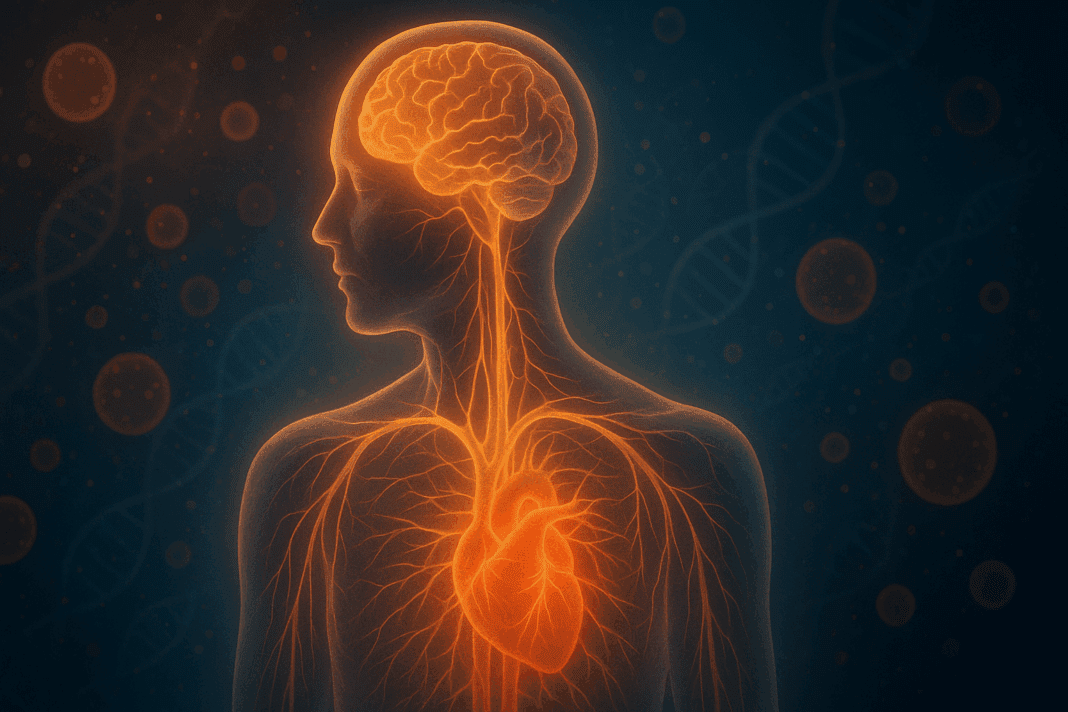Introduction: The Silent Struggle Behind Fatigue, Brain Fog, and Nerve Issues
Fatigue that won’t go away. A strange tingling in your hands. Forgetfulness that creeps in gradually. These symptoms may seem unrelated, but they often share a common root—vitamin B12 deficiency. While often overlooked, a lack of vitamin B12 can have profound effects on your health. From neurological disturbances to cardiovascular risks, understanding the warning signs of low B12 symptoms can illuminate deeper issues with nutrient absorption and overall wellness.
You may also like: Macronutrients vs Micronutrients: What the Simple Definition of Macronutrients Reveals About Your Diet and Health
Vitamin B12, also known as cobalamin, is essential for red blood cell production, nerve function, and DNA synthesis. However, because your body cannot produce B12 on its own, it relies entirely on dietary intake and proper gastrointestinal absorption. This delicate balance makes the risk of vitamin B12 deficiency a real and often underdiagnosed concern. In this article, we explore how multivitamin deficiency symptoms often begin subtly, the underlying causes of B12 depletion, and the broader implications of chronic nutrient deficiency symptoms on long-term health.
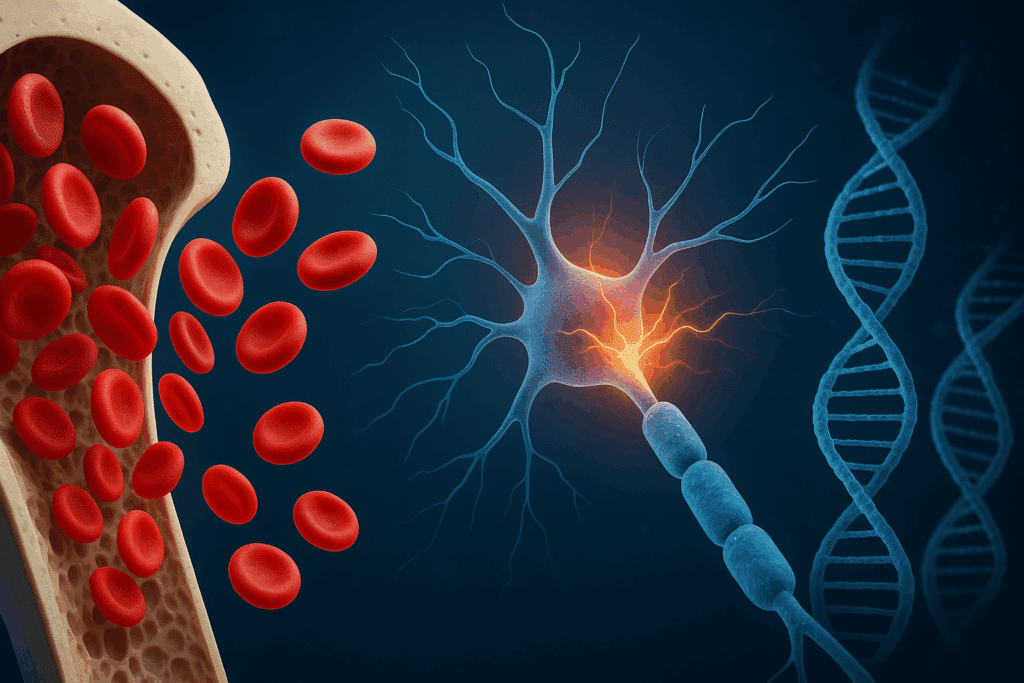
Why Vitamin B12 Matters More Than You Think
Vitamin B12 is not just another micronutrient—it’s vital for the functioning of multiple body systems. It facilitates neurological communication, supports energy metabolism, and plays a key role in the formation of DNA. Its influence on red blood cell production is especially critical, as a deficiency can lead to megaloblastic anemia, which diminishes oxygen delivery throughout the body.
When vitamin B12 levels drop, it can take months—or even years—for symptoms to manifest. However, once they do, they often appear as fatigue, weakness, irritability, or memory issues. These low B12 symptoms are frequently dismissed as part of aging or stress, but they signal that something far more specific is happening inside the body. Understanding vitamin B12 deficiency symptoms early can prevent serious health complications down the road.
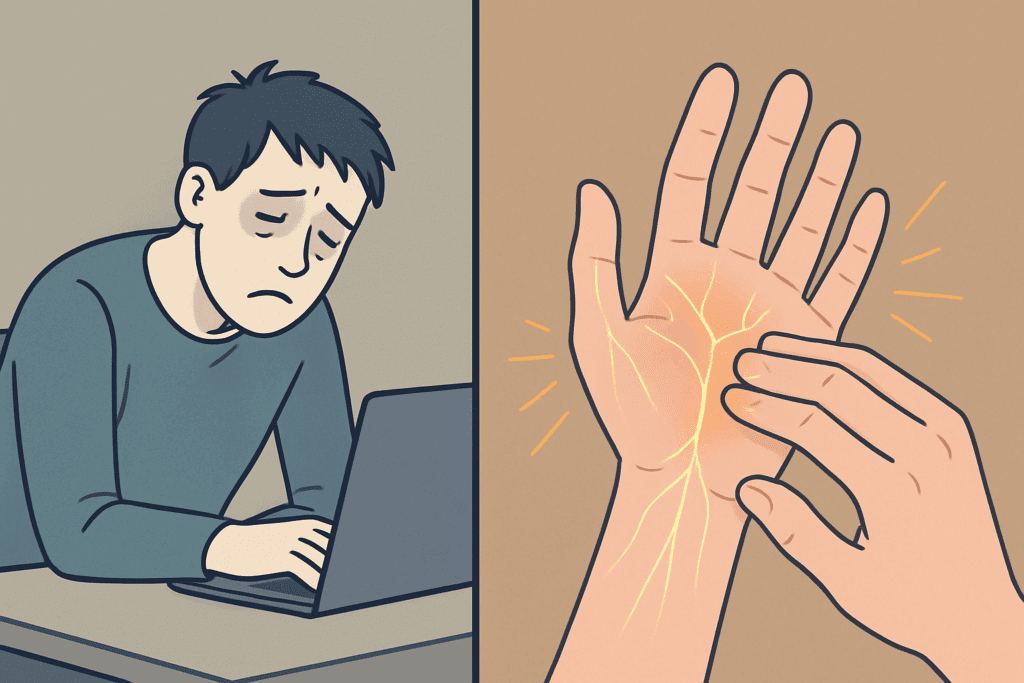
Identifying Early and Advanced B12 Deficiency Symptoms
The body gives many clues when it’s lacking essential nutrients. Early signs of vitamin B12 deficiency might include fatigue, lightheadedness, or pale skin. As the deficiency progresses, neurological symptoms become more pronounced. These may manifest as numbness or tingling in the hands and feet, unsteady gait, muscle weakness, and cognitive decline.
One of the most telling signs of B12 deficiency is peripheral neuropathy—a result of damage to the myelin sheath that protects nerves. Many patients report burning or electric shock sensations, which can become permanent without intervention. Mental health can also suffer. Irritability, depression, and memory problems are commonly reported and often misattributed to other causes. Understanding what causes low B12 is essential for treating the deficiency before it leads to irreversible damage.
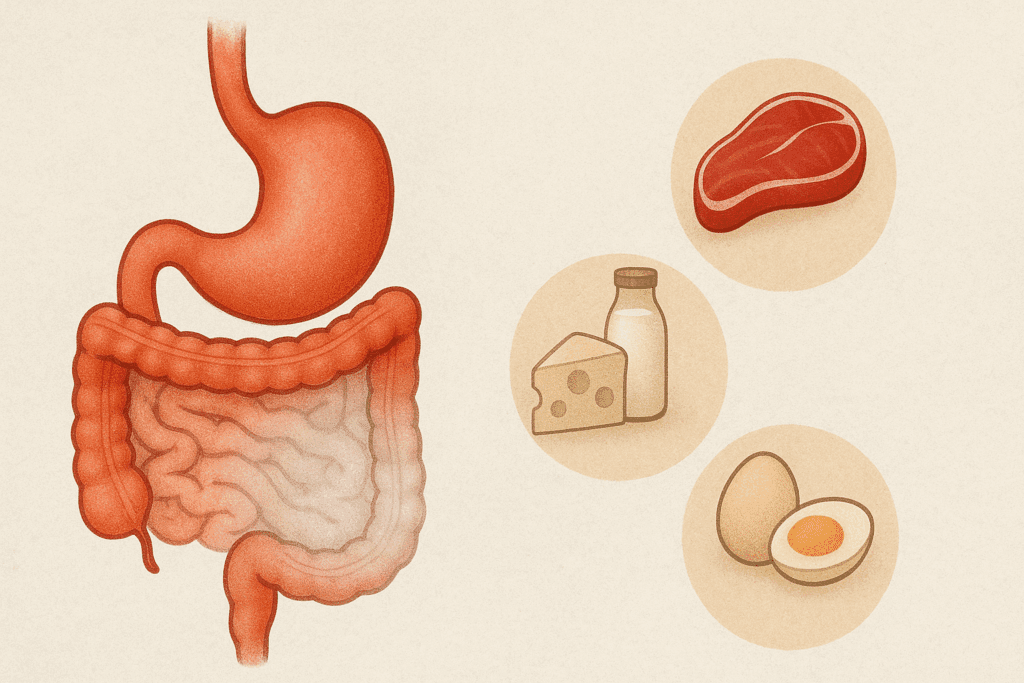
What Causes B12 Deficiency and Why It’s Often Missed
There are several reasons why someone may develop a B12 deficiency. The most straightforward is poor dietary intake. Because B12 is found predominantly in animal products—such as meat, dairy, and eggs—vegans and strict vegetarians are especially susceptible. However, even individuals who consume animal products may develop vitamin B12 deficiency due to malabsorption issues.
Common conditions that impair B12 absorption include atrophic gastritis, pernicious anemia, Crohn’s disease, and celiac disease. In these cases, the problem isn’t dietary intake but the body’s inability to absorb what is consumed. Understanding what causes B12 malabsorption can be the key to uncovering hidden gastrointestinal issues that go undiagnosed for years.
Gastric surgeries, including bariatric procedures, often reduce the stomach’s ability to release intrinsic factor, a protein required for B12 absorption. Without it, even B12-rich diets fall short, making supplementation crucial.

The Role of Medication in B12 Depletion
Many people do not realize that common medications can impair B12 absorption. Proton pump inhibitors (PPIs) and H2 blockers reduce stomach acid, which is necessary for B12 release from food. Similarly, metformin—a common drug for type 2 diabetes—has been shown to reduce B12 levels over time.
Patients taking these medications long-term are at a greater risk of developing B12 deficiency symptoms, often without being warned of the connection. This leads to a cascade of unexplained health issues, including worsening fatigue, brain fog, and even increased fall risk due to impaired coordination.
Knowing what causes B12 vitamin deficiency can help patients and clinicians take proactive steps to monitor nutrient status and avoid long-term damage from what might otherwise seem like a benign prescription.
Aging and the Growing Risk of Nutrient Deficiency
As people age, their bodies become less efficient at absorbing nutrients. One major factor is the reduced production of stomach acid, which compromises the release of vitamin B12 from food. Additionally, the risk of chronic gastritis increases with age, further diminishing nutrient absorption.
In older adults, vitamin B12 deficiency symptoms can be mistaken for normal aging. Memory loss, mood disturbances, and reduced balance may be attributed to getting older, when in fact they are symptoms of low B12. Knowing what causes a lack of B12 in this population is critical to preventing misdiagnosis and unnecessary cognitive decline.
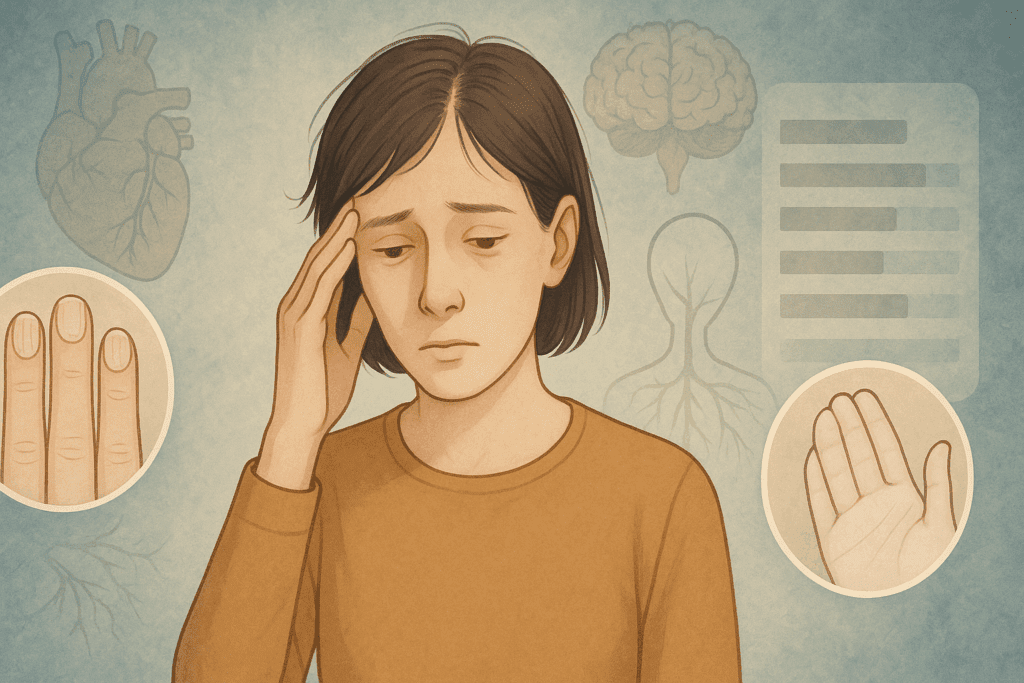
Vitamin B12 Deficiency in the Context of Multivitamin Deficiency Symptoms
Often, B12 deficiency does not occur in isolation. Nutrient deficiency symptoms tend to cluster, especially in cases of gastrointestinal disease or poor diet. Individuals with low B12 levels often present with deficiencies in folate, iron, or magnesium—each of which adds complexity to the clinical picture.
Multivitamin deficiency symptoms may include pale skin, shortness of breath, heart palpitations, hair thinning, and brittle nails. These symptoms of mineral imbalance are easily misinterpreted, but when viewed together, they point to broader absorption issues or systemic nutritional neglect.
Addressing vitamin B12 deficiency in these contexts requires looking at the full nutritional landscape, understanding what are three symptoms of mineral deficiency, and treating the body as a whole system rather than isolating individual symptoms.
The Dangers of Delayed Diagnosis: What Could Happen Without B12
The consequences of untreated vitamin B12 deficiency are severe and often permanent. If left unchecked, B12 deficiency can lead to irreversible nerve damage, dementia-like symptoms, and profound fatigue. It can also contribute to cardiovascular issues due to elevated homocysteine levels—a risk factor for heart disease and stroke.
Moreover, understanding what disease is caused by lack of vitamin B12, such as megaloblastic anemia, helps clarify just how essential this vitamin is. What causes B12 depletion is not just poor diet but systemic issues ranging from autoimmune conditions to drug-nutrient interactions.
Recognizing symptoms early and understanding what causes low vitamin B12 can allow for timely intervention and dramatically reduce the risk of long-term disability.

Testing and Diagnosis: How to Check Vitamin Deficiency the Right Way
While serum B12 levels are a starting point, they don’t always provide the full picture. Some individuals may have borderline or even “normal” levels yet still show clear signs of deficiency. This paradox has prompted many experts to rely on additional markers such as methylmalonic acid (MMA) and homocysteine, which can reveal functional B12 deficiency.
A complete blood count (CBC) may also show large red blood cells, a hallmark of B12-related anemia. Recognizing what are 3 symptoms of vitamin deficiency—like fatigue, mood swings, and tingling—can prompt more thorough testing when routine labs fall short.
Understanding how to interpret symptoms of vitamin deficiency and how to properly evaluate nutrient status is essential for ensuring no early signs are overlooked.
Treatment and Prevention: Supporting Your Health from the Inside Out
Once diagnosed, vitamin B12 deficiency is often easily treatable. Depending on the severity and underlying cause, treatment may involve oral supplementation, high-dose B12 tablets, or intramuscular injections. Those with malabsorption issues generally require long-term or even lifelong B12 injections.
For individuals at risk, including older adults, vegans, or those on certain medications, prevention is key. Taking a high-quality multivitamin or consuming B12-fortified foods can help maintain adequate levels. Forms like methylcobalamin or hydroxocobalamin are generally more bioavailable and ideal for people with digestive concerns.
Prevention also involves regular screening, especially for those with gastrointestinal conditions or on chronic medications. Addressing what causes B12 deficiency early on reduces the likelihood of developing more severe complications associated with what can lack of vitamin B12 cause in the long run.
Nutrition as a Cornerstone of Wellness: The Bigger Picture
When considering what causes B12 deficiency, it’s essential to think beyond a single nutrient. Deficiencies often signal deeper problems with absorption, dietary choices, or health status. Understanding vitamin deficiency symptoms and the broader implications of nutrient imbalance allows for a more holistic view of health.
Clinicians and patients alike benefit from recognizing the patterns associated with what are three symptoms of mineral deficiency and how they intersect with B-vitamin deficiencies. Through this lens, nutrient sufficiency becomes a proactive tool in preventing chronic disease, improving quality of life, and supporting long-term cognitive and cardiovascular health.
Frequently Asked Questions: Vitamin B12 Deficiency and Its Broader Health Implications
1. Can vitamin B12 deficiency symptoms affect emotional well-being and mental health? Absolutely. While vitamin B12 deficiency is often associated with physical symptoms such as fatigue or numbness, it can also significantly impact emotional and cognitive functioning. Low B12 symptoms may include increased irritability, anxiety, depression, and in severe cases, psychosis. These symptoms arise because B12 plays a crucial role in the synthesis of neurotransmitters like serotonin and dopamine, which regulate mood. When left untreated, b12 deficiency symptoms can mimic major depressive disorders or cognitive decline, making accurate diagnosis essential. This highlights how vitamin deficiency symptoms, particularly those involving vitamin B deficiency, extend beyond the physical and influence mental resilience.
2. How do multivitamin deficiency symptoms differ from an isolated vitamin B12 deficiency? Multivitamin deficiency symptoms often present as a broader spectrum of issues affecting skin, nails, hair, mood, energy, and even immunity. While vitamin B12 deficiency symptoms are more neurologically focused, a multivitamin deficiency can simultaneously trigger signs of low iron, folate, vitamin D, and magnesium. People experiencing nutrient deficiency symptoms may notice increased susceptibility to infections, persistent headaches, or brittle hair and nails. Recognizing what are three symptoms of mineral deficiency—like muscle cramps, dizziness, and irregular heartbeat—can help differentiate between a specific vitamin B12 deficiency and a more systemic depletion. It’s also common to see overlapping symptoms when the body is under prolonged nutritional stress, compounding the effects.
3. What long-term damage can occur if vitamin B12 deficiency goes untreated? One of the most severe consequences of untreated vitamin B12 deficiency is irreversible neurological damage. This can include loss of proprioception (awareness of body positioning), balance issues, and long-term cognitive impairments. Over time, demyelination of nerves can cause chronic pain and coordination problems. This illustrates what could happen without B12, especially when symptoms go unnoticed for years. Untreated B12 deficiency may also lead to what disease is caused by lack of vitamin B12, such as megaloblastic anemia, increasing cardiovascular risks due to elevated homocysteine levels. Understanding what causes B12 depletion helps guide timely treatment and reduce the risk of such irreversible outcomes.
4. Are there lesser-known causes of B12 depletion beyond diet and digestion? Yes, emerging research has begun to identify more nuanced factors contributing to what causes low B12. Chronic stress, for instance, can interfere with stomach acid production, impacting B12 absorption over time. Additionally, environmental toxins such as nitrous oxide (used recreationally or in medical settings) can inactivate B12 in the body. Some genetic polymorphisms affecting B12 transport and conversion enzymes also contribute to what causes B12 vitamin deficiency in certain individuals. These lesser-known factors illustrate why it’s essential to take a personalized approach when evaluating vitamin deficiency symptoms, as the root cause may not be immediately apparent from diet alone.
5. How does vitamin B12 deficiency relate to other vitamin or mineral deficiencies? Vitamin B12 deficiency often occurs in tandem with other deficiencies, particularly those involving folate, iron, and vitamin D. These overlapping issues intensify nutrient deficiency symptoms and can obscure the diagnosis. For instance, low folate levels can mask hematologic signs of B12 deficiency while worsening neurological outcomes. Likewise, iron deficiency may amplify fatigue already present in low B12 states. When symptoms of mineral imbalance appear—such as tingling, leg cramps, or rapid heart rate—it’s important to consider what are 3 signs of mineral deficiency in the broader diagnostic picture. Recognizing these interactions can improve treatment outcomes and restore nutrient equilibrium more efficiently.
6. What role does inflammation play in causing low B12 symptoms? Chronic inflammation in the gut or elsewhere in the body can disrupt nutrient absorption, including B12. Conditions like celiac disease, ulcerative colitis, or H. pylori infection contribute to what causes B12 malabsorption by damaging the intestinal lining or altering intrinsic factor activity. Inflammatory responses may also increase the demand for certain nutrients, further exacerbating depletion. Patients with autoimmune disorders are particularly at risk, as their conditions often result in both impaired nutrient uptake and higher metabolic requirements. This interconnection between inflammation and what causes a lack of B12 helps explain why B12 levels can drop even with an adequate diet.
7. How can someone differentiate between general fatigue and fatigue caused by vitamin B deficiency? While general fatigue may result from sleep deprivation, overwork, or stress, fatigue caused by vitamin B deficiency—particularly vitamin B12 deficiency—is often accompanied by other hallmark symptoms. These can include numbness, a swollen tongue, pale skin, and difficulty concentrating. If fatigue does not improve with rest or lifestyle changes, it’s important to explore underlying nutrient deficiency symptoms. B12 deficiency fatigue tends to be more debilitating and persistent, often described as a heavy or foggy sensation that disrupts daily functioning. Recognizing these distinctions helps identify what is the deficiency more accurately and prompts timely intervention.
8. Can vitamin B12 deficiency symptoms appear even when lab tests seem normal? Yes, one of the challenges in identifying B12 deficiency is that serum B12 tests do not always reflect tissue-level deficiencies. Individuals may have “normal” lab values but still suffer from low B12 symptoms due to poor cellular uptake or metabolic inefficiency. This discrepancy is why additional testing—such as methylmalonic acid (MMA) or homocysteine levels—is sometimes necessary to detect what causes low vitamin B12 at a functional level. Understanding how to check vitamin deficiency accurately requires looking beyond single biomarkers and considering the full clinical picture. When symptoms persist despite reassuring labs, further evaluation is warranted.
9. How can lifestyle modifications help prevent or reverse vitamin B12 deficiency? While supplementation is often necessary, certain lifestyle strategies can support better B12 absorption and reduce risk. These include minimizing processed foods, managing stress levels, and avoiding overuse of acid-blocking medications unless medically necessary. Regular consumption of fermented foods and probiotics may also improve gut health, enhancing nutrient absorption and addressing what causes B12 depletion indirectly. Individuals should also be mindful of what one thing that happens when you are deficient of vitamins: reduced resilience. By prioritizing nutrient-rich meals and maintaining a balanced digestive environment, long-term wellness becomes more achievable.
10. Are there populations who should be screened more frequently for B12 deficiency? Yes, certain groups are at higher risk and may benefit from routine screening. These include older adults, vegans, individuals with gastrointestinal disorders, and those taking medications like metformin or PPIs. Pregnant and breastfeeding women also have increased B12 needs and may experience nutrient deficiency symptoms more quickly if intake is inadequate. Understanding what diseases cause B12 deficiency or increase its risk can guide screening strategies. By identifying at-risk individuals and monitoring for vitamin B deficiency early, healthcare providers can prevent serious complications and ensure optimal nutritional status across diverse populations.
Conclusion: Recognizing the Hidden Impacts of Low B12—And Why It Matters
Vitamin B12 deficiency symptoms are more than just isolated complaints; they are warning signs of underlying imbalances that deserve serious attention. Recognizing the early signs of low B12 symptoms—whether fatigue, neuropathy, or mood changes—can be the key to preventing irreversible damage. Understanding what causes low B12 and addressing those factors through dietary, medical, and lifestyle adjustments supports not only nerve health and energy but cognitive clarity and cardiovascular function as well.
Multivitamin deficiency symptoms, especially those tied to vitamin B deficiency and symptoms of mineral imbalance, reflect a broader need for comprehensive nutrition-focused healthcare. Whether through testing, supplementation, or simply better awareness, the goal is to identify what the deficiency is, understand what causes B12 depletion, and take meaningful steps to reverse or prevent it.
In the end, one thing that happens when you are deficient of vitamins is that your body begins to speak louder—through fatigue, pain, memory issues, and more. It’s up to each of us to listen, investigate, and respond with knowledge, care, and the right nutritional support. By prioritizing nutrient sufficiency, we don’t just prevent disease—we empower our bodies to thrive.
Further Reading:
8 Common Signs You’re Deficient in Vitamins and Minerals


